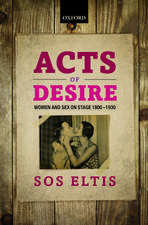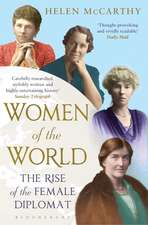Ethics and Human Rights in Anglophone African Women’s Literature: Feminist Empathy: Comparative Feminist Studies
Autor Chielozona Ezeen Limba Engleză Hardback – 27 dec 2016
This book proposes feminist empathy as a model of interpretation in the works of contemporary Anglophone African women writers. The African woman’s body is often portrayed as having been disabled by the patriarchal and sexist structures of society. Returning to their bodies as a point of reference, rather than the postcolonial ideology of empire, contemporary
African women writers demand fairness and equality. By showing how this literature deploys imaginative shifts in perspective with women experiencing unfairness, injustice, or oppression because of their gender, Chielozona Eze argues that by considering feminist empathy, discussions open up about how this literature directly addresses the systems that put them in disadvantaged positions. This book, therefore, engages a new ethical and human rights awareness in African literary and cultural discourses, highlighting the openness to reality that is compatible with African multi-ethnic, multi-racial, and increasingly cosmopolitan communities.
| Toate formatele și edițiile | Preț | Express |
|---|---|---|
| Paperback (1) | 579.67 lei 6-8 săpt. | |
| Springer International Publishing – 7 iul 2018 | 579.67 lei 6-8 săpt. | |
| Hardback (1) | 583.61 lei 6-8 săpt. | |
| Springer International Publishing – 27 dec 2016 | 583.61 lei 6-8 săpt. |
Din seria Comparative Feminist Studies
-
 Preț: 299.34 lei
Preț: 299.34 lei -
 Preț: 302.20 lei
Preț: 302.20 lei - 18%
 Preț: 893.21 lei
Preț: 893.21 lei -
 Preț: 390.84 lei
Preț: 390.84 lei -
 Preț: 392.37 lei
Preț: 392.37 lei -
 Preț: 386.81 lei
Preț: 386.81 lei -
 Preț: 387.38 lei
Preț: 387.38 lei -
 Preț: 383.93 lei
Preț: 383.93 lei - 18%
 Preț: 949.23 lei
Preț: 949.23 lei -
 Preț: 387.38 lei
Preț: 387.38 lei -
 Preț: 388.72 lei
Preț: 388.72 lei -
 Preț: 387.75 lei
Preț: 387.75 lei -
 Preț: 389.70 lei
Preț: 389.70 lei -
 Preț: 385.62 lei
Preț: 385.62 lei -
 Preț: 386.81 lei
Preț: 386.81 lei -
 Preț: 389.70 lei
Preț: 389.70 lei -
 Preț: 388.72 lei
Preț: 388.72 lei -
 Preț: 387.75 lei
Preț: 387.75 lei -
 Preț: 383.93 lei
Preț: 383.93 lei - 15%
 Preț: 696.82 lei
Preț: 696.82 lei - 18%
 Preț: 734.90 lei
Preț: 734.90 lei -
 Preț: 386.99 lei
Preț: 386.99 lei -
 Preț: 388.72 lei
Preț: 388.72 lei -
 Preț: 386.81 lei
Preț: 386.81 lei -
 Preț: 385.62 lei
Preț: 385.62 lei
Preț: 583.61 lei
Preț vechi: 686.60 lei
-15% Nou
Puncte Express: 875
Preț estimativ în valută:
111.69€ • 116.17$ • 92.20£
111.69€ • 116.17$ • 92.20£
Carte tipărită la comandă
Livrare economică 15-29 aprilie
Preluare comenzi: 021 569.72.76
Specificații
ISBN-13: 9783319409214
ISBN-10: 3319409212
Pagini: 246
Ilustrații: XIV, 230 p.
Dimensiuni: 148 x 210 x 18 mm
Greutate: 0.41 kg
Ediția:1st ed. 2016
Editura: Springer International Publishing
Colecția Palgrave Macmillan
Seria Comparative Feminist Studies
Locul publicării:Cham, Switzerland
ISBN-10: 3319409212
Pagini: 246
Ilustrații: XIV, 230 p.
Dimensiuni: 148 x 210 x 18 mm
Greutate: 0.41 kg
Ediția:1st ed. 2016
Editura: Springer International Publishing
Colecția Palgrave Macmillan
Seria Comparative Feminist Studies
Locul publicării:Cham, Switzerland
Cuprins
Introduction: The Ethical Turn in African Literature.- Chapter 1: Feminism as Fairness.- Chapter 2: Diary of Intense Pain: Postcolonial Trap and Women’s Rights.- Chapter 3: The Body in Pain and the Politics of Culture.- Chapter 4: Abstractions as Disablers of Women’s Rights.- Chapter 5: The Enslaved Body as a Symbol of Universal Human Rights Abuse.- Chapter 6: Human Rights as Liberatory Social Thought.- Chapter 7: The Obligation to Bear Testimony to Human Rights Abuses.- Bibliography.-
Notă biografică
Chielozona Eze is Associate Professor of English and Cultural Studies at Northeastern Illinois University, USA. He has held fellowships including the UCLA Global Fellowship and the Stellenbosch Institute for Advanced Studies (STIAS).
Textul de pe ultima copertă
‘A remarkable work, both for its compassion and critical insights, Chielozona Eze’s Ethics and
Human Rights in Anglophone African Women’s Literature: Feminist Empathy ‘liberates’ empathy
from ideology and offers a focused way of reading literature within and across borders that also transcends limiting contexts.’ –Maik Nwosu, University of Denver, USA
‘In a thus far unsurpassed “sharing of affect,” Professor Eze artfully deploys what he calls
“feminist empathy” for third-generation Anglophone African women writers. In the wake of
their foremothers’ rejection of the double yoke of colonialism and patriarchy, this millennial
generation of women writers reclaims “a body of their own” and its unaccountable pain. Eze’s bold yet gentle gesturing towards these new female subjectivities makes him a male
feminist, definitely a rare commodity on the Nigerian scene. His book is a high risk/high gain
venture opening wide the portal of “human flourishing” for other African empathizers in the
post-nation-state.’ –Chantal Zabus, author of Between Rites and Rights: Excision in Women’s
Experiential Texts and Human Contexts, Université Paris 13 – Sorbonne Paris Cité, France
‘Eze deftly demonstrates how contemporary African writing by women deploys feminist
empathy to link ethics and human rights in a fresh interpretation of ubuntu — the African philosophy of individual and community interdependence. With nuance and a rare attention to
not only fiction but also poetry, essays and new media, Eze shows how recent works extending
longstanding African feminist theories into new territory, proving Adichie and her sister-authors
right: we should all be feminists.’ –Tsitsi Jaji, author of Africa in Stereo: Modernism, Music and
Pan-African Solidarity and Associate Professor of English, Duke University, USA
This book proposes feminist empathy as a model of interpretation in the works of contemporary
Anglophone African women writers. The African woman’s body is often portrayed as having been disabled by the patriarchal and sexist structures of society. Returning to their bodies
as a point of reference, rather than the postcolonial ideology of empire, contemporary
African women writers demand fairness and equality. By showing how this literature deploys imaginative shifts in perspective with women experiencing unfairness, injustice, or oppression
because of their gender, Chielozona Eze argues that by considering feminist empathy,
discussions open up about how this literature directly addresses the systems that put them
in disadvantaged positions. This book, therefore, engages a new ethical and human rights
awareness in African literary and cultural discourses, highlighting the openness to reality that is
compatible with African multi-ethnic, multi-racial, and increasingly cosmopolitan communities.
Human Rights in Anglophone African Women’s Literature: Feminist Empathy ‘liberates’ empathy
from ideology and offers a focused way of reading literature within and across borders that also transcends limiting contexts.’ –Maik Nwosu, University of Denver, USA
‘In a thus far unsurpassed “sharing of affect,” Professor Eze artfully deploys what he calls
“feminist empathy” for third-generation Anglophone African women writers. In the wake of
their foremothers’ rejection of the double yoke of colonialism and patriarchy, this millennial
generation of women writers reclaims “a body of their own” and its unaccountable pain. Eze’s bold yet gentle gesturing towards these new female subjectivities makes him a male
feminist, definitely a rare commodity on the Nigerian scene. His book is a high risk/high gain
venture opening wide the portal of “human flourishing” for other African empathizers in the
post-nation-state.’ –Chantal Zabus, author of Between Rites and Rights: Excision in Women’s
Experiential Texts and Human Contexts, Université Paris 13 – Sorbonne Paris Cité, France
‘Eze deftly demonstrates how contemporary African writing by women deploys feminist
empathy to link ethics and human rights in a fresh interpretation of ubuntu — the African philosophy of individual and community interdependence. With nuance and a rare attention to
not only fiction but also poetry, essays and new media, Eze shows how recent works extending
longstanding African feminist theories into new territory, proving Adichie and her sister-authors
right: we should all be feminists.’ –Tsitsi Jaji, author of Africa in Stereo: Modernism, Music and
Pan-African Solidarity and Associate Professor of English, Duke University, USA
This book proposes feminist empathy as a model of interpretation in the works of contemporary
Anglophone African women writers. The African woman’s body is often portrayed as having been disabled by the patriarchal and sexist structures of society. Returning to their bodies
as a point of reference, rather than the postcolonial ideology of empire, contemporary
African women writers demand fairness and equality. By showing how this literature deploys imaginative shifts in perspective with women experiencing unfairness, injustice, or oppression
because of their gender, Chielozona Eze argues that by considering feminist empathy,
discussions open up about how this literature directly addresses the systems that put them
in disadvantaged positions. This book, therefore, engages a new ethical and human rights
awareness in African literary and cultural discourses, highlighting the openness to reality that is
compatible with African multi-ethnic, multi-racial, and increasingly cosmopolitan communities.
Caracteristici
Contributes to the discourse of Anglophone African women’s literature through its focus on feminist empathy as an interpretive model Addresses the ethical implications of literature by engaging a variety of topics including human rights, women’s rights, and genital mutilation Offers new readings of Anglophone African writing by arguing that they displace postcolonial references of empire











